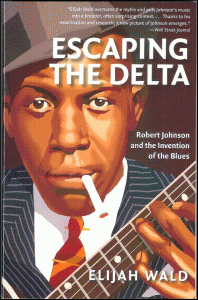 Elijah Wald, in his great book about Robert Johnson, ‘Escaping The Delta’, makes the point that most blues players like Johnson aspired to be the pop stars of their day. On discovering blues music in the Sixties many of their mainly white middle-class fans were happy to go along with the legends of struggling, poverty-stricken, musicians who sold their soul to the devil and played on street corners for loose change – dying in bar-room brawls or from drink or drugs, etc. However, these blues musicians were keen to distance themselves from their humble beginnings, often wearing smart suits and driving expensive cars as soon as they could afford them. Many bands too, such as the Stones, Fleetwood Mac and Led Zeppelin, etc, which took most of their initial inspiration from blues artists like Robert Johnson, though they sang about street life were soon buying expensive real estate and becoming part of the establishment.
Elijah Wald, in his great book about Robert Johnson, ‘Escaping The Delta’, makes the point that most blues players like Johnson aspired to be the pop stars of their day. On discovering blues music in the Sixties many of their mainly white middle-class fans were happy to go along with the legends of struggling, poverty-stricken, musicians who sold their soul to the devil and played on street corners for loose change – dying in bar-room brawls or from drink or drugs, etc. However, these blues musicians were keen to distance themselves from their humble beginnings, often wearing smart suits and driving expensive cars as soon as they could afford them. Many bands too, such as the Stones, Fleetwood Mac and Led Zeppelin, etc, which took most of their initial inspiration from blues artists like Robert Johnson, though they sang about street life were soon buying expensive real estate and becoming part of the establishment.
In my book, ‘The Singer-Songwriter’s Last Stand’, I tell the tale of a young guitar strumming blues enthusiast who bums around seeking his fortune. I say, ‘It didn’t take much intelligence to see, reading the lyrics of most blues numbers, these guys had incredibly tough and evenbleak lives – yet many youngsters like me were not deterred.’ However, despite our dedication, maybe we were missing the point?
Incidentally, any similarity between this much reproduced picture of Robert Johnson and the illustration of Geronimo on my book cover is entirely intentional.
